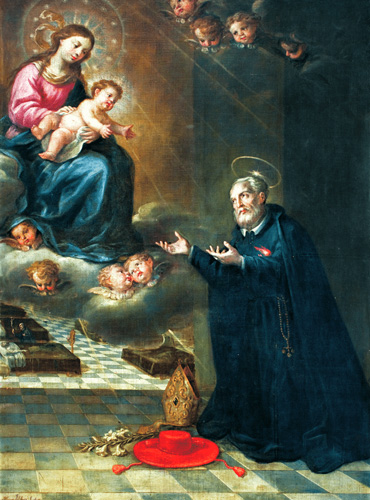Memorial of Saint Philip Neri – May 26th
Today the Church gives us the opportunity to celebrate the memory of Saint Philip Neri. Although he is mostly known for his sense of humor, attested to by his nickname of “God’s clown,” Neri’s profound spiritual life and holiness made him a close friend of Saint Charles Borromeo, Saint Francis Xavier, and Saint Felix of Cantalice, as well as the confessor of Saint Ignatius of Loyola, the spiritual director of Saint Camillus de Lellis, and a friend of many others.[1]
Two virtues or characteristics stand out in Neri’s life of holiness: first, his profound humility, and second, his humor. We know that humility is necessary for growth in the spiritual life, and that without it, God can’t work with us as He desires. Neri was adamant on this point, so much so that oftentimes his penances were ordered to acquiring this virtue, and he would frequently make his brothers in the Oratory practice the virtue as well. The story is told that one day Fr. Agostino, a member of the Oratory, preached a particularly beautiful homily and, in order to keep him humble, Neri ordered him to preach the same homily six weeks in a row, without changing anything, so that people would begin to say, “Here comes that priest who only has one sermon.” We could summarize Neri’s teaching in his four steps of humility: “First, to despise the world, second, to despise no man, third, to despise oneself, and fourth, to despise being despised.”[2]
Neri’s humor, our second point, flows from this overwhelming desire for holiness, so much so that his house was known as the home of Christian mirth. “Christian joy,” he would say, “is a gift of God flowing from a good conscience.” This gift from God, in turn, “strengthens the heart and makes us try harder to have a good life, thus God’s servants must always be in good spirits.” Christians should be happy, he proclaimed, for “a heart filled with joy is more easily made perfect than one that is sad.” Neri’s humor, for which is so well known, was always directed to acquiring humility and advancing souls on the way to perfection.
Lastly, Saint Philip had a deep devotion to our Lady. “Believe me,” he said, “there is no more powerful means to obtain God’s grace than to employ the intercessions of the Holy Virgin.”[3] Let us ask, then, through the intercession of Mary, Queen of all Saints, for the grace of being both humble and joyful so as to advance quickly on the path to holiness and heaven.
[1] Cf. Swetnam, Susan My Best Teachers were Saints.
[2] Matthews, Fr. V. J., Saint Philip Neri: Apostle of Rome . . .
[3] Ryther, Melaine. Angels and Saints and the Rest of Us.





